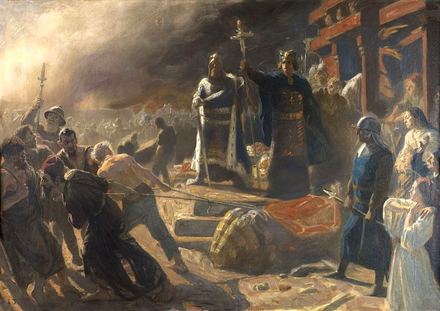
| Part of a series on |
| Slavic Native Faith |
|---|
 |
Slavic Native Faith and Christianity are mutually critical and often directly hostile to each other. Among the Slavic Native Faith (also known as Rodnovery) critiques are a view of religious monotheism as the root of mono-ideologies,[1] by which is meant all ideologies that promote "universal and one-dimensional truths", unable to grasp the complexity of reality and therefore doomed to failure one after the other.[2] These mono-ideologies include Abrahamic religions in general, and all the systems of thought and practice that these religions spawned throughout history, including both Marxism and capitalism, the general Western rationalistic mode of thinking begotten by the Age of Enlightenment,[1] and ultimately the technocratic civilisation based on the idea of possession, exploitation and consumption of the environment.[3] They are regarded as having led the world and humanity to a dead-end,[4] and as destined to disappear and to be supplanted by the values represented by Rodnovery itself.[1] To the "unipolar" world created by the mono-ideologies, and led by the American-influenced West, the Rodnovers oppose their political philosophy of "nativism" and "multipolarism".[5]
For many Rodnovers, Old Testament theology and Christianity are regarded as the foremost cause of the degradation of the world and of humanity.[3] Christianity in particular is denounced as an anthropocentric ideology which distorts the role of mankind in the cosmos by claiming that God could have been incarnated as a single historical entity (Jesus), at the same time creating hierarchical and centralised powers that throughout history defended the rich and legitimised slave mentality.[6] Old Testament and Christian theologies also enforce a separation of the supreme God from the world of nature, not regarded as ennobled by spirit but as inanimate, and this, combined with their anthropocentrism, gives way to an exaltation of the technical power of mankind to possess, exploit and consume the environment.[3] This "dangerous illusion of domination" of humanity over nature,[3] is the root of the ecological disruption,[7] of the spiritual and social crisis that humanity faces in the 21st century, of the "degeneration" (disconnection from the ancestors, the gods, and the ultimate God) of humanity itself.[3] Joining Rodnovery and its values often involves ceremonies of formal rejection of Christianity and its products, called raskrestitsia ("de-Christianisation").[8]
- ^ a b c Aitamurto 2016, p. 123.
- ^ Aitamurto 2016, p. 122.
- ^ a b c d e Chudinov 2015, p. 39.
- ^ Chudinov 2015, pp. 39, 42.
- ^ Aitamurto 2016, p. 114.
- ^ Laruelle 2012, pp. 300–302.
- ^ Laruelle 2008, p. 290.
- ^ Pilkington & Popov 2009, p. 292; Laruelle 2012, p. 307.
© MMXXIII Rich X Search. We shall prevail. All rights reserved. Rich X Search
